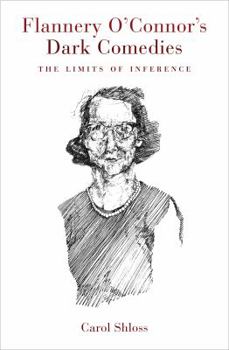Flannery O'Connor's Dark Comedies (Southern literary studies)
Select Format
Select Condition 
Book Overview
In Flannery O'Connor's Dark Comedies, Carol Shloss moves from biographical, thematic, and theological approaches and instead focuses her criticism on the successes and failures of O'Connor as a... This description may be from another edition of this product.
Format:Hardcover
Language:English
ISBN:0807106747
ISBN13:9780807106747
Release Date:January 1980
Publisher:Louisiana State University Press
Length:159 Pages
Customer Reviews
1 rating
Considers O'Connor's use of rhetorical devices, symbolism and allusion to convey Christian reality..
Published by Thriftbooks.com User , 16 years ago
Shloss addresses Flannery O'Connor's use of rhetorical devices to infer "secondary levels of implication" in her stories. Argues that, because of the "pointed relationship between the conclusions of inference and the mental resources of the perceiver," O'Connor carefully considered her reader's ability to understand and infer from her text. Cites evidence that O'Connor "addressed herself precisely to those who were untutored in religious belief," and argues that "it is in terms of those readers" that critics ought to "evaluate the success of her rhetoric." Contends that because O'Connor frequently violated "the commitment to represent the concrete world with fidelity," and because she "did not think that reality was Reality," using the term "realism" to describe her fiction is inaccurate. Offers as evidence, her own comments, which point out how, for O'Connor, reality was "not the tangible world encountered without delusion, but a dimension of perception ... transcending the substantial field of sense impressions." Uses these previous discussions as background for examining her use of symbols, Christian myth, similes, metaphor, and O'Connor's "romantic tendency to analogize" in order to "dehumanize and distance the human life rendered" in her fiction. Follows with explications of "Greenleaf" and "The Displaced Person," to illustrate how O'Connor's "analogies begin with the concrete world as theme," and -- using the process of inference - then, lead the reader "not directly to the spirit, but to an expanded sense of the physical environment." Explicates The Violent Bear It Away and contends that while the allusions in this novel are clear, O'Connor intrudes at the end and "defines the precise ordering of values on which a reader's judgment depends, even when biblical references are clearly presented." Looks at O'Connor's manipulation of the reader's sympathy toward old Tarwater, and argues that the novel's characters serve merely as "a portrayal of monomania." Remarks that because her "manipulation of attitude toward Tarwater and the boy is [both] complex and ambiguous," she ultimately fails "to provide clear guidance" to the reader. Concludes that -- despite O'Connor's hesitancy "to 'tell' enough to make textual meanings unambiguous to the nonreligious" -- her writings "retains a weight of human concern that makes the reading" of her fiction "a disturbing encounter, valuable to readers of any persuasion because its haunting truth rests on sharable experience rather than prohibitive religious allusion." Appears to be based on the author's Ph.D. dissertation completed in 1974 at Brandeis University, titled: "The Limits of Inference: Flannery O'Connor and the Representation of 'Mystery.'" R. Neil Scott / Middle Tennessee State University





